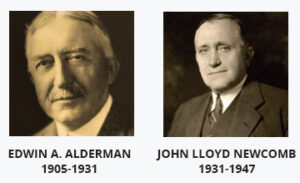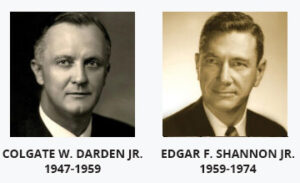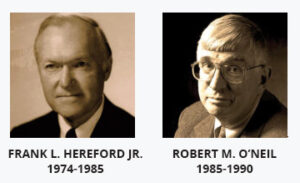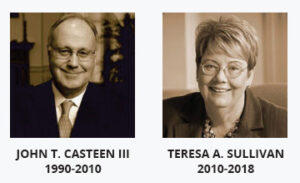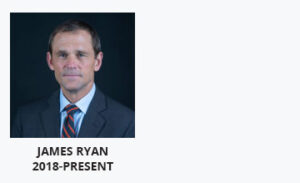UVA 101
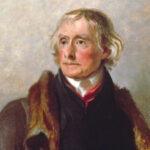 Founded in 1819 by Thomas Jefferson, the University of Virginia, distinguished as one of the eight original Public Ivy universities, is consistently rated as one of the best public institutions in the country. Jefferson – who lived nearby at his mountaintop home, Monticello – was deeply involved in the creation of the University, planning the curriculum, recruiting the initial faculty and designing what he called the Academical Village, a tidy arrangement of residential and academic buildings around a rectangular and terraced green space called the Lawn.
Founded in 1819 by Thomas Jefferson, the University of Virginia, distinguished as one of the eight original Public Ivy universities, is consistently rated as one of the best public institutions in the country. Jefferson – who lived nearby at his mountaintop home, Monticello – was deeply involved in the creation of the University, planning the curriculum, recruiting the initial faculty and designing what he called the Academical Village, a tidy arrangement of residential and academic buildings around a rectangular and terraced green space called the Lawn.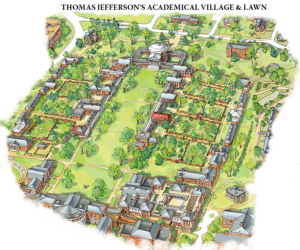
The Academical Village is recognized for its cultural and architectural importance as a United Nations Educational, Scientific and Cultural Organization (UNESCO) World Heritage Site. Jefferson’s vision was to create a university offering courses of study in professions beyond religion and politics – the first of its kind in the United States. When it opened for classes in 1825, the eight-person faculty taught ancient and modern languages, moral and natural philosophy, chemistry, law and medicine.
Over the past 200 years, the University has witnessed many changes to the student body and faculty. In 1953, Walter Ridley became the first African American graduate from the University, and in 1970 UVA became fully coeducational, enrolling 450 undergraduate women. These and other social evolutions have improved the University, which in the latter part of the 20th century began to solidify its modern position as one of the finest public universities in the country.
As its third century begins, “The 2030 Plan” sets out four overarching strategic goals for the University: strengthen UVA’s foundation; cultivate the most vibrant, inclusive community in higher education; enable discoveries that enrich and improve lives; and make UVA synonymous with service.
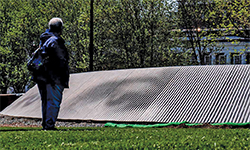
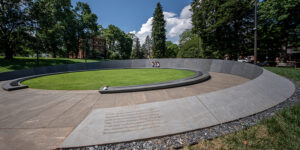
The Memorial to Enslaved Laborers began with a student-led effort, which acknowledges those enslaved African Americans who built and worked at the University of Virginia. The memorial stands east of Brooks Hall and the Rotunda near The Corner. The broken ring symbolizing broken shackles is about 80 feet in diameter, emulating the dimensions of Jefferson’s Rotunda. Inside the outer ring is a second ring that contains a timeline of slavery at the University.
President’s Commission on Slavery and the University: Memorial to Enslaved Laborers
The University of Virginia provides array of services to deliver an inclusive experience for the entire UVA community and visiting guests. Visit UVA Accessibility for more information.
College and Graduate School of Arts and Sciences – The largest school at UVA is comprised of more than 15,000 undergraduate and graduate students in more than 50 majors and concentrations. (Year founded: 1824)
School of Engineering and Applied Science – Experiential learning, lab work and research experience are hallmarks of the “E-School,” one of the oldest engineering programs in the country, which has roughly 3,000 students. (Year founded: 1836)
McIntire School of Commerce – The “Comm School” is considered one of the country’s best undergraduate business programs. The McIntire School also grants graduate degrees in commerce, accounting and IT management. (Year founded: 1921)
School of Architecture – The well-regarded “A-School” offers rigorous courses of study in architectural design, history, landscaping and planning, with the aim to create more just, sustainable and healthy societies. (Year founded: 1954)
School of Education and Human Development – One of the leading education schools in the country utilizes an evidence-based approach to develop leaders in the practice of education, health and human services. (Year founded: 1905)
School of Medicine – At one of UVA’s founding schools, medical students are divided into four colleges to learn the innovative “NxGen” curriculum focused on patient-centered care and evidence-based medicine. (Year founded: 1819)
School of Nursing – UVA’s tight-knit, progressive nursing program offers top-rated undergraduate and graduate degrees, which emphasize diversity and compassion through interprofessional education and training. (Year founded: 1901)
Frank Batten School of Leadership and Public Policy – The multidisciplinary Batten School aims to train curious, ethical and purpose driven students to solve the world’s toughest public policy challenges. (Year founded: 2007)
Darden School of Business – Through Darden’s signature case method and experiential learning, the graduate business school has earned a reputation as a top-notch producer of future business leaders and entrepreneurs. (Year founded: 1954)
School of Data Science – The University’s newest school — the first of its kind in the nation — seeks to improve society through teaching and research based on the powerful, emerging field of data science. (Year founded: 2019)
School of Law – As the second-oldest continuously operating law school in the United States, UVA Law is considered a world-renowned training ground for skilled lawyers and legal experts for nearly 200 years. (Year founded: 1819)
School of Continuing and Professional Studies – Designed to offer opportunities to busy professionals, the school of continuing education offers flexible coursework and distance learning in various fields. (Year founded: 1915)
Virginia Festival of the Book – brings together writers and readers to promote and celebrate books, reading, literacy, and literary culture. (March)
The Virginia Film Festival – celebrates the magic of the movies and bringing actors, directors, writers and audiences together. (Fall)
The Virginia Theatre Festival – hosts leading directors, designers, technicians, and actors to form a company and produce a season of musicals and plays. (Summer)
UVA Chamber Music Series – brings professional performances to the University community while providing inspired learning opportunities. (Fall-Spring)
Charlottesville Symphony – comprised of University music faculty, talented students and community members who work to provide powerful symphonic experiences for the community and K-12 classrooms throughout the region. (Fall-Spring)
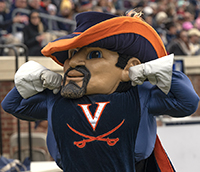
• School colors are Orange & Blue (The old colors of cardinal and Confederate gray became orange and blue due to their better visibility on muddy athletic fields.)
• The campus of the university is referred to as the “Grounds”
• Students are called Wahoos, often shortened to ‘Hoos
• The school mascot is the Cavalier
• Freshmen, sophomores, juniors, and seniors are called first-years, second-years, third-years, and fourth-years to reflect Jefferson’s belief that learning is a lifelong process, rather than one to be completed within four years.
Admissions (434) 982-3200
Alumni Association (434) 243-9000
Arts Box Office (434) 924-3376
Athletic Tickets (434) 924-8821
Bookstore (434) 924-3721
Emergency 911
The Fralin Museum of Art (434) 924-3592
Housing & Residence Life (434) 924-3736
Info (General) (434) 924-0311
John Paul Jones Arena Tickets (434) 243-4960
Kluge-Ruhe Aboriginal Art Collection (434) 244-0234
Miller Center (434) 924-7236
Newcomb Hall Info (434) 924-3601
Registrar (434) 924-4122
Rotunda Tour (434) 924-7969
Parking & Transportation (434) 924-7231
University Guide Service (434) 924-3239
UVA Health (434) 924-0000
UVA Health – Patient Info (434) 982-1100
UVA Police (434) 924-7166
UVA Today: The Daily Report
Curated every weekday to keep you up-to-date on the latest UVA news.
The Cavalier Daily
Student-run, independent, daily news organization at the University.
WTJU 91.1FM
Presents diverse programming of music and other forms of expression.
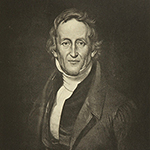 In 1842, UVA law professor Henry St. George Tucker, Jr. created the first honor code, after one of his colleagues was murdered on The Lawn. Students simply must not lie, cheat, or steal, according to the system. It was a “single sanction” system, in which committing any of these offenses resulted in being expelled from school. In the spring of 2022, following decades of criticism and declining support for the system, the penalty of expulsion was replaced with a two-term suspension after a student referendum unanimously voted in favor of the proposal (80% of the vote).
In 1842, UVA law professor Henry St. George Tucker, Jr. created the first honor code, after one of his colleagues was murdered on The Lawn. Students simply must not lie, cheat, or steal, according to the system. It was a “single sanction” system, in which committing any of these offenses resulted in being expelled from school. In the spring of 2022, following decades of criticism and declining support for the system, the penalty of expulsion was replaced with a two-term suspension after a student referendum unanimously voted in favor of the proposal (80% of the vote).
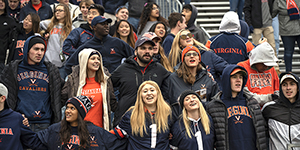
“The Good Old Song” is the de facto school song of the University of Virginia.
Verse 1
That good old song of Wah-hoo-wah—we’ll sing it o’er and o’er
It cheers our hearts and warms our blood to hear them shout and roar
We come from old Virginia, where all is bright and gay
Let’s all join hands and give a yell for the dear old UVA.
Chant
Wah-hoo-wah, wah-hoo-wah! Uni-v, Virginia!
Hoo-rah-ray, hoo-rah-ray, ray, ray—UVA!
Verse 2
What though the tide of years may roll, and drift us far apart
For alma mater still there’ll be a place in every heart.
In college days we sing her praise, and so, when far away,
In memory we still shall be at the dear old UVA.

